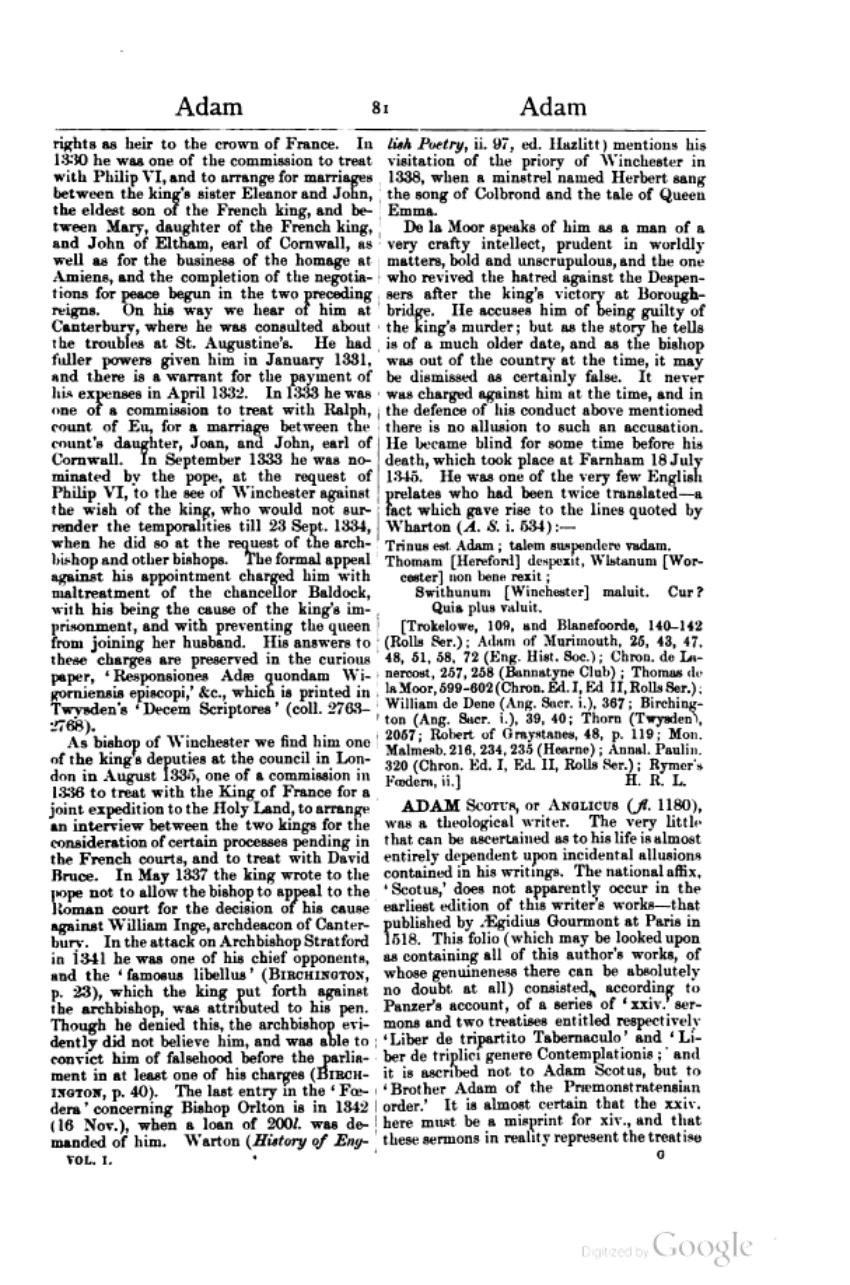rights as heir to the crown of France. In 1330 he was one of the commission to treat with Philip VI, and to arrange for marriages between the king's sister Eleanor and John, the eldest son of the French king, and between Mary, daughter of the French king, and John of Eltham, earl of Cornwall, as well as for the business of the homage at Amiens, and the completion of the negotiations for peace begun in the two preceding reigns. On his way we hear of him at Canterbury, where he was consulted about the troubles at St. Augustine's. He had fuller powers given him in January 1331, and there is a warrant for the payment of his expenses in April 1332. In 1333 he was one of a commission to treat with Ralph, count of Eu, for a marriage between the count's daughter, Joan, and John, earl of Cornwall. In September 1333 he was nominated by the pope, at the request of Philip VI, to the see of Winchester against the wish of the king, who would not surrender the temporalities till 23 Sept. 1334, when he did so at the request of the archbishop and other bishops. The formal appeal against his appointment charged him with maltreatment of the chancellor Baldock, with his being the cause of the king's imprisonment, and with preventing the queen from joining her husband. His answers to these charges are preserved in the curious paper, ‘Responsiones Adæ quondam Wigorniensis episcopi,’ &c., which is printed in Twysden's ‘Decem Scriptores’ (coll. 2763–2768).
As bishop of Winchester we find him one of the king's deputies at the council in London in August 1335, one of a commission in 1336 to treat with the King of France for a joint expedition to the Holy Land, to arrange an interview between the two kings for the consideration of certain processes pending in the French courts, and to treat with David Bruce. In May 1337 the king wrote to the pope not to allow the bishop to appeal to the Roman court for the decision of his cause against William Inge, archdeacon of Canterbury. In the attack on Archbishop Stratford in 1341 he was one of his chief opponents, and the ‘famosus libellus’ (Birchington, p. 23), which the king put forth against the archbishop, was attributed to his pen. Though he denied this, the archbishop evidently did not believe him, and was able to convict him of falsehood before the parliament in at least one of his charges (Birchington, p. 40). The last entry in the ‘Fœdera’ concerning Bishop Orlton is in 1342 (16 Nov.), when a loan of 200l. was demanded of him. Warton (History of English Poetry, ii. 97, ed. Hazlitt) mentions his visitation of the priory of Winchester in 1338, when a minstrel named Herbert sang the song of Colbrond and the tale of Queen Emma.
De la Moor speaks of him as a man of a very crafty intellect, prudent in worldly matters, bold and unscrupulous, and the one who revived the hatred against the Despensers after the king's victory at Boroughbridge. He accuses him of being guilty of the king's murder; but as the story he tells is of a much older date, and as the bishop was out of the country at the time, it may be dismissed as certainly false. It never was charged against him at the time, and in the defence of his conduct above mentioned there is no allusion to such an accusation. He became blind for some time before his death, which took place at Farnham 18 July 1345. He was one of the very few English prelates who had been twice translated—a fact which gave rise to the lines quoted by Wharton (A. S. i. 534):—
Trinus est Adam; talem suspendere vadam.
Thomam [Hereford] despexit, Wlstanum [Worcester] non bene rexit;
Swithunum [Winchester] maluit. Cur?
Quia plus valuit.
[Trokelowe, 109, and Blanefoorde, 140–142 (Rolls Ser.); Adam of Murimouth, 25, 43, 47, 48, 51, 58, 72 (Eng. Hist. Soc.); Chron. de Lanercost, 257, 258 (Bannatyne Club); Thomas de la Moor, 599–602 (Chron. Ed. I, Ed. II, Rolls Ser.); William de Dene (Ang. Sacr. i.), 367; Birchington (Ang. Sacr. i.), 39, 40; Thorn (Twysden), 2057; Robert of Graystanes, 48, p. 119; Mon. Malmesb. 216, 234, 235 (Hearne); Annal. Paulin. 320 (Chron. Ed. I, Ed. II, Rolls Ser.); Rymer's Fœdera, ii.]
ADAM Scotus, or Anglicus (fl. 1180), was a theological writer. The very little that can be ascertained as to his life is almost entirely dependent upon incidental allusions contained in his writings. The national affix, ‘Scotus,’ does not apparently occur in the earliest edition of this writer's works—that published by Ægidius Gourmont at Paris in 1518. This folio (which may be looked upon as containing all of this author's works, of whose genuineness there can be absolutely no doubt at all) consisted, according to Panzer's account, of a series of ‘xxiv.’ sermons and two treatises entitled respectively ‘Liber de tripartito Tabernaculo’ and ‘Liber de triplici genere Contemplationis;’ and it is ascribed not to Adam Scotus, but to ‘Brother Adam of the Præmonstratensian order.’ It is almost certain that the xxiv. here must be a misprint for xiv., and that these sermons in reality represent the treatise
